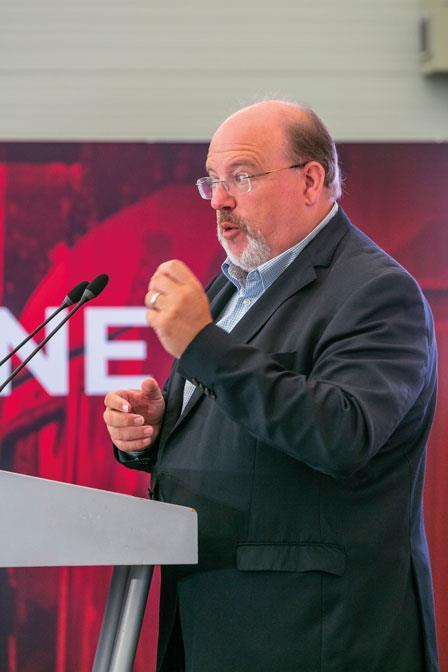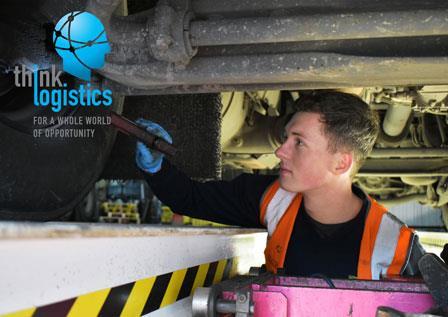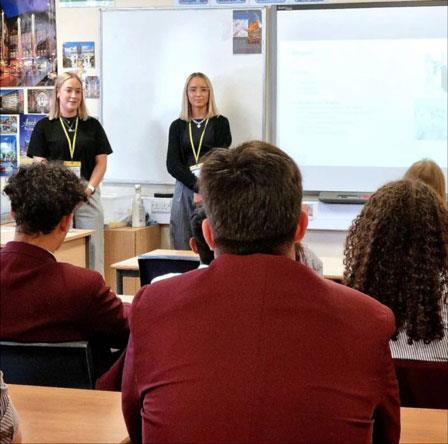Generation Logistics secured a further £300,000 of DfT funding for its second year to continue raising the profile of logistics in schools and colleges, by supporting educators with resources and materials, as well as talking directly to young people and other potential recruits to the sector by continuing a heavyweight social media campaign. Transport secretary Mark Harper MP announced the second tranche of funding by video link at Road Transport Expo 2023 in June, pictured.
As in year one, when the DfT invested £345,000, this public funding will represent under a third of income, with the majority coming in sponsorship from logistics companies and trade associations.
Launched in August 2022, Generation Logistics is a ground-breaking collaboration managed by the CILT (UK) and Logistics UK supported by the DfT, more than 30 leading companies and 17 trade associations including the RHA and UKWA.
An Ambassadors Network has also been established, with now over 290 logistics professionals working to inform and inspire new talent through events and engagements.
To date, the campaign has:
• Reached an audience of over 460m people
• Generated over 650,000 visits to the Generation Logistics Hub to see information about logistics and opportunities within the sector
• Resulted in over 3 million engagements with interested individuals on social media alone
Phil Roe, executive sponsor of Generation Logistics, pictured, welcomed the DfT backing.

“It is fantastic news that the DfT has committed to supporting Generation Logistics for a further year and is recognition of the results we have achieved so far,” he says. “This support lays the foundations for the campaign to push into its second year at what is a critical time for the industry.”
Roe, who is also president of Logistics UK and a board member of the CILT, has over 25 years’ experience in the logistics sector, including 18 years with DHL Supply Chain. He tells MT how Generation Logistics came into being.
“The original idea for a campaign to raise awareness of logistics as a great place to work came from a discussion that David Wells [CEO of Logistics UK] had with Grant Shapps MP, [then transport secretary] in early 2022,” he says. “That was partly because we'd seen the success other sectors have had doing similar things.
“Also, I think it was a general feeling that the sector had been hiding its colours for too long. As a critical sector underpinning the rest of the UK economy, we need to get out there.”
The transport and logistics sector has long been bedevilled by a silo mentality, with each trade association ploughing its own furrow, but a new spirit of cooperation – especially since Richard Smith took over as MD of the RHA in January 2022 – meant that the CILT and Logistics UK could go to the DfT and speak on behalf of the whole industry.
“We took a decision fairly early on to do this in a very collaborative manner,” says Roe. “The approach to setting up the campaign with the DfT was that the CILT, which is a charity operating a ring-fenced financial arrangement, would work with Logistics UK to create collaboration across all different areas of logistics, from private operators to public sector bodies and trade associations.
“Fundamentally, Generation Logistics is an awareness campaign supported by the government, but overwhelmingly financed by the private sector, to raise awareness of the great careers and opportunities that exist within the industry.”
Piecemeal attempts have been made to promote careers in logistics to young people – remember Love Logistics? – but achieving the scale needed to reach millions of potential recruits required everyone to pull together to secure government cash.
“It uses the collateral that's gained by working with the sponsors and the trade associations to promote the industry to people who are not working in logistics,” explains Roe. “That is really critical because sometimes it goes under the radar. The social media campaigns that we've put together are absolutely aimed at people who don't work in logistics rather than the people who already do.”
Roe says Generation Logistics is an “umbrella project”, pulling together people from Logistics UK and CILT into a team, rather than a company and the money raised by Generation Logistics is held in a restricted fund by the CILT.
In its first year Generation Logistics raised just under £900,000 from industry sponsors, and it is looking to raise a slightly smaller sum in year two, as the setup costs were all in the first year.
“The project has a steering team made up of a number of the gold sponsors,” he goes on. “Ultimately, it has a reporting line into the DfT as well, because they've put quite a bit of money into it. We haven't set it up as a separate company or anything like that, mainly because there was no need to.
“It's a project using the best of abilities across the sector.”

The programme is managed by Bethany Windsor, pictured, who has been at CILT (UK) for six years and for nine years was a committee member at Women in Logistics UK, a forum of CILT (UK) that works to connect, engage and inspire those working in the logistics sector.
Windsor also oversees the management of the NOVUS programme, which brings together 10 leading UK universities with students wanting to study for logistics and supply chain degrees and 19 sector-based sponsoring companies.. She was also briefly the liaison between social mobility charity Career Ready and Think Logistics, the forerunner to Generation Logistics founded by Abbey Logistics chairman Steve Granite in 2013. Two full time members of staff have been appointed to handle PR and marketing, supported by a digital marketing and PR agency, ilk, focusing on direct communication to consumers of all ages.
But a major element in the programme remains giving logistics professionals the tools to go out to schools and colleges to evangelise about the careers available in the industry, part of the programme which will be expanded in year two of the campaign to include the creation of educational materials for a range of core subjects.
“In December we invited people to come and be an ambassador for the programme,” says Roe. “We have about 290 of them at the moment. Where we get requests to work with schools on careers days we send those volunteer ambassadors to attend or run events.”
A key aim of Generation Logistics is to coordinate and standardise the efforts that many operators already make to work with their local schools and colleges.
“We’ve seen a huge amount of endeavor across all different regions, and a lot of that reflects the characters of the leaders,” says Roe. “But if you go into schools and if you look at lessons, for example, there's nothing around logistics.
“We're not going to be a separate part of the curriculum but we are creating logistics-themed lessons that can be used in maths, in business studies and in geography. The feedback that we've picked up is nobody really knows what logistics is; we've got to do something about that.”
Teachers often welcome outside assistance in creating lessons that address parts of the National Curriculum in subject areas they are not always familiar with.
“Those lessons can be used across the whole of the UK. They will be free and available for teachers to be able to download into their subject areas,” says Roe. “We're aiming at the years coming into GCSEs to create more understanding and insight into logistics in the first instance.
“The second thing is that there is a really big gap in careers advice in schools. There's nothing for the educators and the teachers that explains the great roles that exist within logistics. We created a careers guide for logistics using case studies from the sponsors. These are real people, most of them young people, talking about their jobs.”
As many transport company MDs will testify, gaining access to teachers can still be a challenge as many people within a school may be involved in the decision-making process.
“Those two things combined are great, but how do we get them into the schools?” asks Roe. “Getting into schools consistently has been a massive problem. What we're in the final stages of concluding at the moment are arrangements with two really powerful organisations that have presence, effectively, between them, across all schools in the UK.
“That means that we will be able to get to teachers with a consistent message backed up with resources that they can use to promote logistics to young people in a way that we've never been able to do across all schools.
“We might have done it really well in some schools, but then there are a lot of schools where there is nothing. I know that from my own personal experience, going into the schools in my locality."

Roe’s personal experience has been helped by the fact his wife is a primary school teacher and the science, technology, engineering and maths (STEM) ambassador for her school.
“The approach that they use in schools with STEM is very much what we want to follow,” he says. “We give teachers the capability, the resources, the lesson plans, the exercises to encourage more understanding of logistics. We can also back that up with the ambassadors in all different areas to go into schools and reinforce that message.
“We're not trying to boil the ocean here because I think we need to resist the urge. We're not aiming at primary schools this year, we're really focusing on the GCSE years and older, so age 13 through to 24.”
Generation Logistics needs more logistics professionals to devote time to becoming ambassadors and going into their local schools to provide careers advice – even if their employer is not a sponsor.

“About 50% of our ambassadors come from our sponsor organisations,” says Roe. “What's been really interesting is the other 50% don't, they're people who wanted to get involved. We set up a LinkedIn page to do that, also coordinated through the CILT, to pair up opportunities with ambassadors.”
While there seems to be a day, week or month these days for everything from hedgehog awareness to donkey rescue, Generation Logistics is launching a logistics week, which could involve logistics sites throwing open their doors to host visits from local students.
“We'll run that in the summer next year to try and get more local engagement,” says Roe. “We've not pinpointed the actual week yet but we're looking to do it immediately after the different exams are finished.”
As well as in-person visits, the project has had a lot of success with online sessions, which can involve parents as well as students and teachers.
“Going into schools and getting schools to come into logistics facilities is important, but we've had some really good attendance on logistics-themed online events already,” says Roe. “We know that parents are one of the big three influences on young people's career choices, the other two being social media and careers advice from schools and teachers.”
Squeezes on education budgets over the years means that careers advice in schools is now somewhat patchy.
“From what we've seen, it's quite variable,” says Roe. “In bigger schools, there definitely are careers advisors, in the smaller schools maybe not. So much of it now is online. One of the organizations that we are working with deals with all of those people around the UK
“That's one of the areas that Bethany's been working on. It builds solidly on the work that she and the CILT have been doing in education for many years.”
As Roe says, the third big influence over young people’s career choices is now social media. This is a notoriously difficult space for corporates to work in, so how will Generation Logistics make it work?
“By not being corporate!” laughs Roe. “The reason why we selected ilk when we first started the programme is because they're a young, quite small agency that really challenged us to not be corporate.
“They work closely with the team. Then take input, a lot of video case studies - over 100 now - from the sponsors, so that we can get real people talking in real language rather than it looking corporate.
“The tailoring of the campaigns, the posts and the video content is all put together for us by ilk and is specifically designed to attract that target audience. It's done in ways that create curiosity, and create a reaction.”
While the number of views isn’t quite in Beyonce territory they are impressive for a logistics awareness campaign.
“The numbers just go up and up and up,” says Roe. “We've had over 3.3 million engagements with our social media campaign. That's people actually doing something, either liking or sharing or following through. That's only happened because we have made an effort and deliberately focused on the voices and faces of young people, and the messages of real people talking about real jobs with a bit of passion. That's what works really.
“We've got young drivers on there, people who work in warehouses, project managers, and people who work in sustainability. We’ve got people who work for logistics operators and also people who work for retailers. There’s a real variety in there and that’s what captures people's imagination and creates curiosity.”
While a lot of attention was focused last year on the HGV driver shortage, logistics needs people at all levels.
“One of the key messages is that there is something for everybody here,” says Roe. “It doesn't matter really about educational attainment. There are roles in logistics for different personalities and different interests. We're not trying to campaign or recruit. What we are trying to do is to show the variety of roles that exist within the industry.
“We agreed with the sponsors quite early on to use a number of job families to simplify things for people coming to it fresh, so they didn't have to already know logistics to understand the job adverts.
“We have 14 different job families. The core operational job families are around transportation, warehousing and infrastructure. Because we have Network Rail and National Highways among our sponsors. Underneath that, we give them examples of roles within a job family and of the starting salaries for those as well.
“Then around those core operational roles, we then have all the support functions, including finance, HR and sustainability plus engineering and technical skills which is one of the areas that we are seeing shortages.”
There is however still a missing link between raising awareness of logistics among young people and actually finding the right employer and training scheme for them. The industry has paid in over £1bn in Apprenticeship Levy but claimed back less than a third of that sum to fund apprenticeships. While there are 37 approved logistics apprenticeships there is no single industry-wide career structure guiding new entrants through the opportunities and how to grasp them.
“Individual organisations of all shapes and sizes have had to get better at recruitment over the last two years,” says Roe. “I've seen this first-hand in my old job [at DHL] but I also see it when I go around and talk to members now.
“There is a lot more focus on people and recruitment and thinking about what the opening offer is. When we set up Generation Logistics, we were very clear that what we wanted to do was to create the awareness, to give the attraction for people to come to companies in the first place.
“Ultimately, recruitment is a competitive process for organisations. We're never going to standardise that across 250,000 companies. What we want to be able to do is to get that out there to show what there is.”
So with getting on for £2m to be spent by August 2024, what will success look like?
“The main measures are through our social media,” he says. “We've also got KPIs on engagements in terms of our website visits and how many ambassador events we will have done as well. The big new question will be how many times will the lessons that we've created been downloaded by schools.
“They're slightly different measures of the same thing, which is all about raising awareness.”
Opening up Generation Logistics to smaller operators
In its second year, Generation Logistics wants to attract more smaller operators as sponsors and to get more involved in the project.
“We've deliberately made a move to offer a much lower cost sponsorship route for smaller companies,” says Roe. “Most of the sponsors in the first year - not all of them, but a lot of them - were larger companies. We want to see that broaden and many more smaller companies coming in which is why we’ve said that companies with turnovers of less than £20m will be able to sign up for the year as Silver sponsors for £2,000.”
Becoming part of Generation Logistics enables smaller operators to get their ambassadors into local schools and allows them to create social media content such as videos of younger members of staff extolling the benefits of working for the firm.
“You get the opportunity to get your people talking about what it's like working for a smaller company in the industry as well as the guys working for a larger company,” says Roe. “Those case studies and that material then become public.
“For many of the smaller companies, they're never going to have the opportunity to do that. We provide the ways of being able to capture that, of recording it, and then publicising it in a way that a small company is very unlikely to be able to do for themselves.”
Logistics can be tough but is still 'a great place to work'
It is well documented that one reason for the recent driver shortage wasn’t a lack of people with HGV licences – it was a lack of people wanting to work in an industry with a notoriously poor track record of managing and retaining skilled people. But Roe insists that logistics is getting its house in order.
“My experience over 35 years is that it is a great place to work,” he says. “I'd regard logistics as the ultimate team game. If you work well with people, if you want to make things happen, if you want to have an impact on a daily basis, if you want to see the fruits of your labour in terms of the service that you offer to customers and consumers, then there's a very real rush you can get from that.
“Ultimately, every business sector in the economy has to be able to attract the right talent in order to be successful. I think the industry is very different now than it was 30 years ago when I joined.
“The layers and layers of management don't exist anymore and health and safety is a huge amount better.
“It can be a tough job, but it can be also a hugely rewarding job.”













